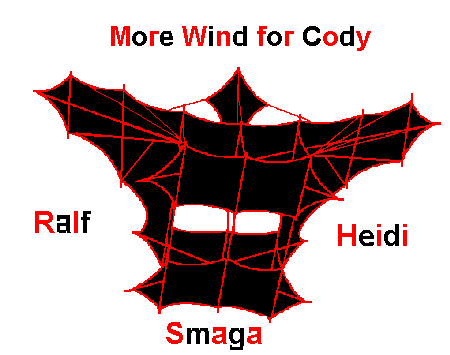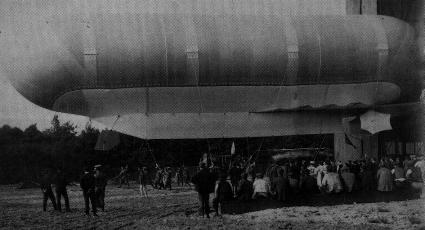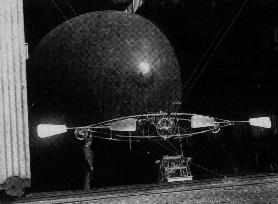In 1902 Colonel James Lethbridge
Brooke Templer became chief of Her Majesty's Balloon Factory at
Aldershot, with the design and construction of an airship
instructed. It was felt that it was about time England needed a
military airship. However, adverse circumstances delayed the
construction of the airship. In 1907 Templer retired and on his
recommendation came Colonel John Edward Capper. S.F. Cody, who
worked on the airship, said when asked what he's doing?: "I'm
working on the scaffolding but not designing it. I'm buying the
engine for the government. I'm also designing the mount for the
engine and the device to transmit engine power to the front part.
Indeed, it is the design by me and some parts were made by my hands
in my forge on my lathe. I also designed the parts that control the
airship." The length was about 37 m, the diameter about 8 m, the
outer shell was made of cow intestines that were placed in twelve
layers on top of each other. The gondola was about 1m wide and about
11m long and could be closed on the sides with fabric panels against
wind and rain. To start the engine using two propellers in the form
of paddles decreed, a wheel attached to the crankshaft behind the
engine had to be turned. They said Cody was the only one strong
enough to start the engine. The maiden flight was watched by a large
crowd on September 10, 1907 at Farnborough. During this flight, the
Nulli-Secundus was still attached to the ground with a rope. On
board were Colonel Capper, Captain King (balloon flight instructor)
and Cody. They climbed to a height of about 50 m. This attempt was
repeated several times. Another attempt should be made at around 3
p.m. one climbed up, but the people were unable to hold the airship
and left it free. In order not to have to land in a few trees after
a few minutes of flight, Cody called the ground crew through a
megaphone and they had to tow the airship back to the hangar.
*



